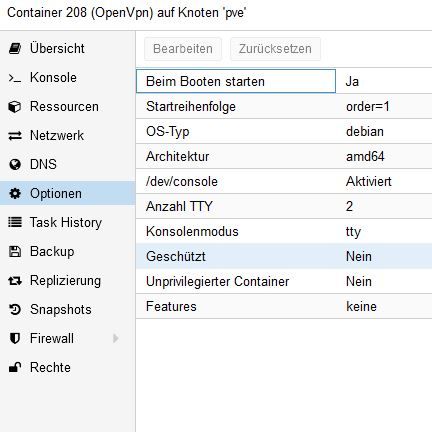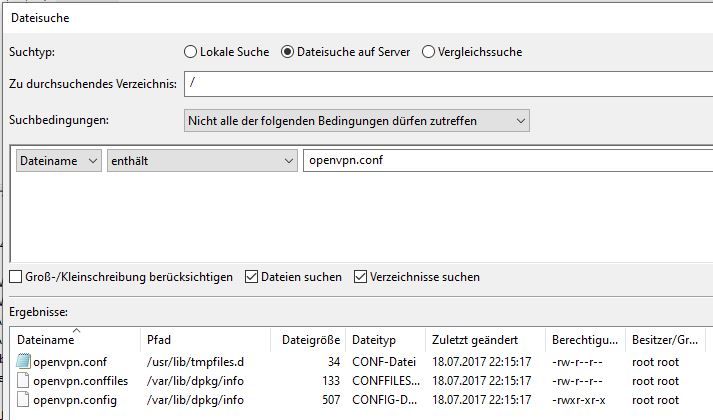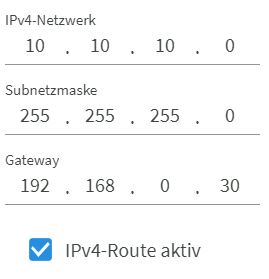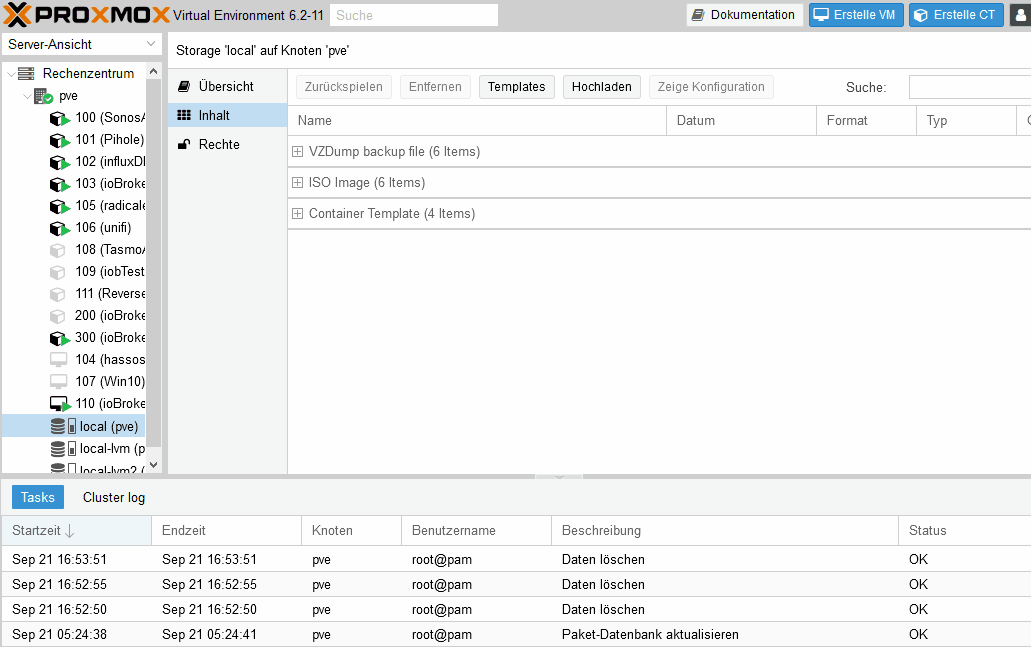NEWS
Tut-OpenVPN Server im Container unter Proxmox
-
@lemuba habe auch noch eine Ergänzung:
für den Download der Datei "mydevice.ovpn" kann man auch folgendes machen:in der Konsole eingeben:
/var/www/openvpn/bin/addprofile mydevicemydevice ist in dem Fall der erstellte Client-Name
Dann wird eine URL und ein Pfad angezeigt.jetzt Im Browser eingeben (vorher anpassen):
https://IP_vom_OpenVPN_Server/profiles/45454545fdgngdgmn4156154xfj15xhmg5/dann bekommt man das hier angezeigt:

Dann entweder auf download klicken oder mir den Handy den QR scannen. -
@lemuba jetzt noch meine Frage:
um von außen in sein Netzwerk zu kommen muss man doch noch:- in der Fritte eine statische Route eintragen
- Datei openvpn.conf noch anpassen
Korrekt?
-
@crunchip sagte in Tut-OpenVPN Server im Container unter Proxmox:
@lemuba sagte in Tut-OpenVPN Server im Container unter Proxmox:
Danach installierst Du von den Proxmox Container Templates:
turnkey-openvpnAls Ergänzung, damit die Installation überhaupt funktioniert
Beim CT erstellen muss Unprivilegierter Container Haken entfernt werdenHast Du Recht - mal sehen was sonst noch so reinkommt - ergänze/korrigiere ich dann noch Oben....
Ist schon paar Tage her wo ich das eingerichtet hatte. Den Haken nehme ich eigentlich immer raus.
So schauts bei mir aus.
-
@Lenny-CB sagte in Tut-OpenVPN Server im Container unter Proxmox:
@lemuba jetzt noch meine Frage:
um von außen in sein Netzwerk zu kommen muss man doch noch:- in der Fritte eine statische Route eintragen
- Datei openvpn.conf noch anpassen
Korrekt?
In der Fritte eine statische Route eintragen: Ja, hatte ich ja oben beschrieben.
Datei openvpn.conf noch anpassen
Die Datei mal gesucht:

Siehst Du auch am Datum, hatte ich nicht geändert.
Aktueller Datei Inhalt:
d /run/openvpn 0755 root root - -
Aber Du hast Recht, irgendwo muss ich noch was editiert haben, da das Schlüsselfile den Link auf meinen DynDns Account enthält.
Schaue ich heute Abend nach... -
@lemuba sagte in Tut-OpenVPN Server im Container unter Proxmox:
In der Fritte eine statische Route eintragen: Ja, hatte ich ja oben beschrieben.
Ich meine nicht die DynDns-Geschichte. Ich meine eine "IPv4-Route".
Ich bin jetzt auch nicht grad der VPN-Spezi, aber ohne diese IPv4-Route finden deine Antwortpakete nicht mehr den Weg zu Dir zurück.Wenn ich z.B. bei bestehender VPN-Verbindung in meinem Handy die interne IP vom ioBroker eingebe, bekomme ich die Seite angezeigt.
Das passiert aber nicht wenn ich die IPv4-Route nicht eintrage und die .conf Datei nicht anpasse.
Dafür ist das Routing zwischen den virtuellen und internen Netzwerk.
@VPN-Spezis: bitte berichtigen wenn Quark schreibe. Ich will ja auch noch lernen.
Nachtrag: etwas weiter oben meinte ich die Datei "server.conf" (/etc/openvpn/server.conf)
-
@Lenny-CB sagte in Tut-OpenVPN Server im Container unter Proxmox:
@lemuba sagte in Tut-OpenVPN Server im Container unter Proxmox:
In der Fritte eine statische Route eintragen: Ja, hatte ich ja oben beschrieben.
Ich meine nicht die DynDns-Geschichte. Ich meine eine "IPv4-Route".
Ich bin jetzt auch nicht grad der VPN-Spezi, aber ohne diese IPv4-Route finden deine Antwortpakete nicht mehr den Weg zu Dir zurück.Wenn ich z.B. bei bestehender VPN-Verbindung in meinem Handy die interne IP vom ioBroker eingebe, bekomme ich die Seite angezeigt.
Das passiert aber nicht wenn ich die IPv4-Route nicht eintrage und die .conf Datei nicht anpasse.
Dafür ist das Routing zwischen den virtuellen und internen Netzwerk.
@VPN-Spezis: bitte berichtigen wenn Quark schreibe. Ich will ja auch noch lernen.
Nachtrag: etwas weiter oben meinte ich die Datei "server.conf" (/etc/openvpn/server.conf)
Auf alle Fälle scheinst Du schon mal Recht zu haben - ich verstehe auch nicht viel von VPN

Hatte bis Dato nur versucht, das mein Client/Iphone die Verbindung aufbaut - und das funktioniert ja - Statische Route hatte ich keine eingeben, oder konfiguriert - somit wie gerade festgestellt, komme ich auch noch nicht in mein Heimnetzwerk - hatte gerade das noch gefunden und muss nun selber erstmal schauen wie, was, wo:https://serversupportforum.de/threads/turnkey-openvpn-fuer-kommunikation-im-heimnetz.59876/
-
@lemuba
schau dir mal die server.conf an.--> nano /etc/openvpn/server.conf
hinzufügen:
push "route 192.168.2.0 255.255.255.0" push "dhcp-options DNS 192.168.2.1"--> push "route 192.168.2.0 255.255.255.0" verweist auf das interne Netzwerk, ggf. muss das auf dein Netzwerk anpassen
--> push "dhcp-options DNS 192.168.2.1" verweist auf den internen DNS-Server. Im Regelfall der Router), wieder anpassendann noch die folgende Zeile auskommentieren
push "route 10.10.10.0 255.255.255.0"dann noch die IPv$-Route in der Fritte:
--> Heimnetz/Netzwerk/Netzwerkeinstellungen/IPv4-Routen
neue Route Anlegen:
IPv4Netzwerk: 10.10.10.0 --> IP vom virtuellen Netz Subnetzmaske: 255.255.255.0 --> Sub vom virtuellen Netz Gateway: 192.168.0.30 --> IP von OpenVPN-Server
auf dein Netz anpassen, dann sollte es mit den internen IP durch den Tunnel funzen. -
was ich aber merkwürdig finde:
ich muss dennoch eine Portfreigabe machen.Ich meine damit:
192.168.2.45:8081 geht nur durch den Tunnel wenn ich den entsprechenden Port in der Fritte weiterleite
192.168.2.45:8081 funktioniert ohne Portweiterleitung nur im "richtigen" internen Netz.Weis wer warum?
-
Tja, ich bringe es leider nicht hin.
Mit turnkey-init kann man das Teil ja sozusagen resetten und die Installationsroutine neu starten. Dabei die Adressen wieder eingeben.
Ich habe letztendlich die voreigestellten 10er (10.x.x.x Adressen) genommen. So oder so, ich komme leider mit keinem Routing in der Fritzbox hin.Mein Router: 192.168.12.1
Mein TKVPN: 192.168.12.8Meine Server Config:
# PUBLIC_ADDRESS: ich.selfhost.eu (used by openvpn-addclient) port 1194 proto udp dev tun comp-lzo keepalive 10 120 persist-key persist-tun user nobody group nogroup chroot /etc/openvpn/easy-rsa/keys/crl.jail crl-verify crl.pem ca /etc/openvpn/easy-rsa/keys/ca.crt dh /etc/openvpn/easy-rsa/keys/dh2048.pem tls-auth /etc/openvpn/easy-rsa/keys/ta.key 0 key /etc/openvpn/easy-rsa/keys/server.key cert /etc/openvpn/easy-rsa/keys/server.crt ifconfig-pool-persist /var/lib/openvpn/server.ipp client-config-dir /etc/openvpn/server.ccd status /var/log/openvpn/server.log verb 4 # virtual subnet unique for openvpn to draw client addresses from # the server will be configured with x.x.x.1 # important: must not be used on your network server 10.55.75.0 255.255.255.0 # push routes to clients to allow them to reach private subnets push "route 10.0.1.0 255.255.255.0"Ich glaube ich haue das Ding (Container) in die Tonne und suche was besser dokumentiertes. Hatte mir nun auch schon die Finger wund gegoogelt.
-
@lemuba is doch fast gut. Bin grad nicht am Rechner. Schreib morgen noch was dazu.
In der Installation hast du 2 unterschiedliche 10er IPs eingetragen? -
@lemuba
so wie es ausschaut, hast Du 2 verschiedene IP-Bereiche angegeben bei der Installation. In einer Videoanleitung die ich mal gesehen habe, wurde gesagt, dass die gleich sein können. Habe ich dann bei mir auch so gemacht.Für deinen Fall, wenn sie unterschiedlich sind (ungetestet!)
nano /etc/openvpn/server.conf
zu deiner vorhandenen server.conf hinzufügenpush "route 192.168.12.0 255.255.255.0" push "dhcp-options DNS 192.168.12.1"Ich gehe davon aus, dass deine Fritzbox auch den DNS macht.
FRITZ.Box--> Heimnetz/Netzwerk/Netzwerkeinstellungen/IPv4-Routen
neue Route anlegen:IPv4Netzwerk: 10.55.75.0 --> IP vom virtuellen Netz Subnetzmaske: 255.255.255.0 --> Sub vom virtuellen Netz Gateway: 192.168.12.8 --> IP von OpenVPN-Server -
@Lenny-CB sagte in Tut-OpenVPN Server im Container unter Proxmox:
@lemuba
so wie es ausschaut, hast Du 2 verschiedene IP-Bereiche angegeben bei der Installation. In einer Videoanleitung die ich mal gesehen habe, wurde gesagt, dass die gleich sein können. Habe ich dann bei mir auch so gemacht.Diese Videoanleitung hatte ich auch schon durch... kein Erfolg, dann wurde noch nichtmal die Client-Verbindung auf dem Iphone Grün.:
Die von Dir vorgeschlagne server.conf Settings und Routings auch ohne Erfolg bisher.
Ich schaue nochmal in Ruhe am Wochenende. Ich denke ich werde aber auch nochmal direkt ein Debian OpenVpn/nicht Turnkey aufsetzen/testen.
Ich bin eigentlich Weltmeister im Googeln Aber die Turnkey VPN Doku ist armselig - dachte erst, weil als Proxmox Template angeboten, dass da mehr hinter steht... offentsichlich nicht.
Aber die Turnkey VPN Doku ist armselig - dachte erst, weil als Proxmox Template angeboten, dass da mehr hinter steht... offentsichlich nicht.Bei meiner vorheringen Lösung, Dietpi/Open VPN (nun abgeschaltet), brauchte ich überhaupt kein Routing auf meiner Fritte einstellen. Kam über Jahre so problemlos in mein Heimnetz - kann aber sein, dass ich "damals" DHCP-technisch, etc. noch was an der Diskstation selber einstellen musste - nur kann ich mich da nicht mehr dran erinnern

Das ist nun auch das Tolle an Proxmox, den einzelnen Containern und VMs - man kann überall seine Notizen/Links reinschreiben...
-
@lemuba sagte in Tut-OpenVPN Server im Container unter Proxmox:
Diese Videoanleitung hatte ich auch schon durch.
welche war das?
vllt hilft das hier
https://administrator.de/wissen/openvpn-server-installieren-pfsense-firewall-mikrotik-dd-wrt-gl-inet-router-123285.html#toc-17 -
-
@lemuba
 dacht ich mir
dacht ich mir
habs bissher auch nicht hinbekommen, scheiter am unifi
aber irgendwo hab ich mal was mitbekommen, dasTunim Video fehlt, das muss noch gesetzt/aktiviert werden, ohne gehts nicht,
kenn mich damit selbst nicht aus -
@lemuba sagte in Tut-OpenVPN Server im Container unter Proxmox:
Die hier:
genau das meine ich. Danach habe ich das auch gemacht. Verbindung war dann OK. Nur aufs interne Netz ging es nicht.
@crunchip sagte in Tut-OpenVPN Server im Container unter Proxmox:
@lemuba sagte in Tut-OpenVPN Server im Container unter Proxmox:
Diese Videoanleitung hatte ich auch schon durch.
welche war das?
vllt hilft das hier
https://administrator.de/wissen/openvpn-server-installieren-pfsense-firewall-mikrotik-dd-wrt-gl-inet-router-123285.html#toc-17und dieser Link brachte mich dann zur den push-Routen und der IPv4-Route.
Ist schon sehr merkwürdig.

-
danke für das Tut

Ich kann leider in meinem Proxmox (6.2-11) kein turnkey-openvpn Template finden.
Kann ich das irgendwo runterladen? -
@H4lunkE sagte in Tut-OpenVPN Server im Container unter Proxmox:
Kann ich das irgendwo runterladen?
Ja:

-
Danke, wie ich das den Tag übersehen konnte, ist mir ein Rätsel.

-
So, nach einer endlosen Odysse habe ich nun anscheinend einen funktionierenden OpenVpn Container hinbekommen - wer Ihn testen möchte, anbei der Download Link - ich lasse den ein paar Tage aktiv...:
Download Link.... Klick mich. Edit 12. Oktober: Habe den DL entfernt. Falls noch jemand testen möchte, schickt mir bitte ne PM für einen Link.
Beim Zurückspielen über Proxmox Backup/Restore den Haken bei "Priviligierter Container" rausnehmen, sonst gibt es eine Fehlermeldung/geht es nicht...
Einiges vorab - eingeflossen in den Container sind Infos und Settings aus:
https://www.hungred.com/how-to/setup-openvpn-on-proxmox-lxc/
https://bugs.debian.org/cgi-bin/bugreport.cgi?bug=939903
(Hi, enabling the lxc nesting feature for the container solved the issue for me...)
https://forum.proxmox.com/threads/lxc-als-openvpn-server-keine-netzwerkverbindung.52546/
https://www.cyberciti.biz/faq/debian-10-set-up-openvpn-server-in-5-minutes/
Was Ihr nach dem Import des Containers machen müsst:
Eure eigene IPv4 und Gateway Adresse eintragen.
Den Container starten - über die Proxmox Konsole einloggen:User: root
Pw: root(PW danach gerne ändern;-) )
In der Konsole dann:
Debian GNU/Linux 10 VPNBackup tty1 VPNBackup login: root Password: Last login: Tue Oct 6 14:34:54 CEST 2020 on tty1 Linux VPNBackup 5.4.60-1-pve #1 SMP PVE 5.4.60-2 (Fri, 04 Sep 2020 10:24:50 +0200) x86_64 The programs included with the Debian GNU/Linux system are free software; the exact distribution terms for each program are described in the individual files in /usr/share/doc/*/copyright. Debian GNU/Linux comes with ABSOLUTELY NO WARRANTY, to the extent permitted by applicable law. root@VPNBackup:~# sudo ./debian10-vpn.sh Welcome to the OpenVPN installer! The git repository is available at: https://github.com/angristan/openvpn-install I need to ask you a few questions before starting the setup. You can leave the default options and just press enter if you are ok with them. I need to know the IPv4 address of the network interface you want OpenVPN listening to. Unless your server is behind NAT, it should be your public IPv4 address. IP address: 192.168.12.80 It seems this server is behind NAT. What is its public IPv4 address or hostname? We need it for the clients to connect to the server. Public IPv4 address or hostname: DeinDynDnsAccount Checking for IPv6 connectivity... Your host appears to have IPv6 connectivity. Do you want to enable IPv6 support (NAT)? [y/n]: n What port do you want OpenVPN to listen to? 1) Default: 1194 2) Custom 3) Random [49152-65535] Port choice [1-3]: 1 What protocol do you want OpenVPN to use? UDP is faster. Unless it is not available, you shouldn't use TCP. 1) UDP 2) TCP Protocol [1-2]: 1 What DNS resolvers do you want to use with the VPN? 1) Current system resolvers (from /etc/resolv.conf) 2) Self-hosted DNS Resolver (Unbound) 3) Cloudflare (Anycast: worldwide) 4) Quad9 (Anycast: worldwide) 5) Quad9 uncensored (Anycast: worldwide) 6) FDN (France) 7) DNS.WATCH (Germany) 8) OpenDNS (Anycast: worldwide) 9) Google (Anycast: worldwide) 10) Yandex Basic (Russia) 11) AdGuard DNS (Anycast: worldwide) 12) NextDNS (Anycast: worldwide) 13) Custom DNS [1-12]: 9 Do you want to use compression? It is not recommended since the VORACLE attack make use of it. Enable compression? [y/n]: n Do you want to customize encryption settings? Unless you know what you're doing, you should stick with the default parameters provided by the script. Note that whatever you choose, all the choices presented in the script are safe. (Unlike OpenVPN's defaults) See https://github.com/angristan/openvpn-install#security-and-encryption to learn more. Customize encryption settings? [y/n]: n Okay, that was all I needed. We are ready to setup your OpenVPN server now. You will be able to generate a client at the end of the installation. Press any key to continue... Hit:1 http://security.debian.org buster/updates InRelease Hit:2 http://ftp.debian.org/debian buster InRelease Hit:3 http://ftp.debian.org/debian buster-updates InRelease Hit:4 https://deb.nodesource.com/node_12.x buster InRelease Reading package lists... Done Reading package lists... Done Building dependency tree Reading state information... Done gnupg is already the newest version (2.2.12-1+deb10u1). ca-certificates is already the newest version (20200601~deb10u1). 0 upgraded, 0 newly installed, 0 to remove and 0 not upgraded. Reading package lists... Done Building dependency tree Reading state information... Done curl is already the newest version (7.64.0-4+deb10u1). iptables is already the newest version (1.8.2-4). openssl is already the newest version (1.1.1d-0+deb10u3). wget is already the newest version (1.20.1-1.1). ca-certificates is already the newest version (20200601~deb10u1). The following additional packages will be installed: easy-rsa libccid libglib2.0-0 libglib2.0-data liblzo2-2 libpcsclite1 libpkcs11-helper1 libusb-1.0-0 opensc opensc-pkcs11 pcscd shared-mime-info xdg-user-dirs Suggested packages: pcmciautils resolvconf openvpn-systemd-resolved The following NEW packages will be installed: easy-rsa libccid libglib2.0-0 libglib2.0-data liblzo2-2 libpcsclite1 libpkcs11-helper1 libusb-1.0-0 opensc opensc-pkcs11 openvpn pcscd shared-mime-info xdg-user-dirs 0 upgraded, 14 newly installed, 0 to remove and 0 not upgraded. Need to get 0 B/5493 kB of archives. After this operation, 24.3 MB of additional disk space will be used. Preconfiguring packages ... Selecting previously unselected package easy-rsa. (Reading database ... 30802 files and directories currently installed.) Preparing to unpack .../00-easy-rsa_3.0.6-1_all.deb ... Unpacking easy-rsa (3.0.6-1) ... Selecting previously unselected package libusb-1.0-0:amd64. Preparing to unpack .../01-libusb-1.0-0_2%3a1.0.22-2_amd64.deb ... Unpacking libusb-1.0-0:amd64 (2:1.0.22-2) ... Selecting previously unselected package libccid. Preparing to unpack .../02-libccid_1.4.30-1_amd64.deb ... Unpacking libccid (1.4.30-1) ... Selecting previously unselected package libglib2.0-0:amd64. Preparing to unpack .../03-libglib2.0-0_2.58.3-2+deb10u2_amd64.deb ... Unpacking libglib2.0-0:amd64 (2.58.3-2+deb10u2) ... Selecting previously unselected package libglib2.0-data. Preparing to unpack .../04-libglib2.0-data_2.58.3-2+deb10u2_all.deb ... Unpacking libglib2.0-data (2.58.3-2+deb10u2) ... Selecting previously unselected package liblzo2-2:amd64. Preparing to unpack .../05-liblzo2-2_2.10-0.1_amd64.deb ... Unpacking liblzo2-2:amd64 (2.10-0.1) ... Selecting previously unselected package libpcsclite1:amd64. Preparing to unpack .../06-libpcsclite1_1.8.24-1_amd64.deb ... Unpacking libpcsclite1:amd64 (1.8.24-1) ... Selecting previously unselected package libpkcs11-helper1:amd64. Preparing to unpack .../07-libpkcs11-helper1_1.25.1-1_amd64.deb ... Unpacking libpkcs11-helper1:amd64 (1.25.1-1) ... Selecting previously unselected package opensc-pkcs11:amd64. Preparing to unpack .../08-opensc-pkcs11_0.19.0-1_amd64.deb ... Unpacking opensc-pkcs11:amd64 (0.19.0-1) ... Selecting previously unselected package opensc. Preparing to unpack .../09-opensc_0.19.0-1_amd64.deb ... Unpacking opensc (0.19.0-1) ... Selecting previously unselected package openvpn. Preparing to unpack .../10-openvpn_2.4.7-1_amd64.deb ... Unpacking openvpn (2.4.7-1) ... Selecting previously unselected package pcscd. Preparing to unpack .../11-pcscd_1.8.24-1_amd64.deb ... Unpacking pcscd (1.8.24-1) ... Selecting previously unselected package shared-mime-info. Preparing to unpack .../12-shared-mime-info_1.10-1_amd64.deb ... Unpacking shared-mime-info (1.10-1) ... Selecting previously unselected package xdg-user-dirs. Preparing to unpack .../13-xdg-user-dirs_0.17-2_amd64.deb ... Unpacking xdg-user-dirs (0.17-2) ... Setting up xdg-user-dirs (0.17-2) ... Setting up libglib2.0-0:amd64 (2.58.3-2+deb10u2) ... No schema files found: doing nothing. Setting up liblzo2-2:amd64 (2.10-0.1) ... Setting up libpkcs11-helper1:amd64 (1.25.1-1) ... Setting up opensc-pkcs11:amd64 (0.19.0-1) ... Setting up libglib2.0-data (2.58.3-2+deb10u2) ... Setting up shared-mime-info (1.10-1) ... Setting up libpcsclite1:amd64 (1.8.24-1) ... Setting up libusb-1.0-0:amd64 (2:1.0.22-2) ... Setting up easy-rsa (3.0.6-1) ... Setting up openvpn (2.4.7-1) ... [ ok ] Restarting virtual private network daemon.:. Created symlink /etc/systemd/system/multi-user.target.wants/openvpn.service -> /lib/systemd/system/openvpn.service. Setting up libccid (1.4.30-1) ... Setting up opensc (0.19.0-1) ... Setting up pcscd (1.8.24-1) ... Created symlink /etc/systemd/system/sockets.target.wants/pcscd.socket -> /lib/systemd/system/pcscd.socket. Processing triggers for man-db (2.8.5-2) ... Processing triggers for mime-support (3.62) ... Processing triggers for libc-bin (2.28-10) ... Processing triggers for systemd (241-7~deb10u4) ... --2020-10-06 16:16:34-- https://github.com/OpenVPN/easy-rsa/releases/download/v3.0.7/EasyRSA-3.0.7.tgz Resolving github.com (github.com)... 140.82.121.3 Connecting to github.com (github.com)|140.82.121.3|:443... connected. HTTP request sent, awaiting response... 302 Found Location: https://github-production-release-asset-2e65be.s3.amazonaws.com/4519663/0fa24e00-72ba-11ea-9afe-6e5829eec4a4?X-Amz-Algorithm=AWS4-HMAC-SHA256&X-Amz-Credential=AKIAIWNJYAX4CSVEH53A%2F20201006%2Fus-east-1%2Fs3%2Faws4_request&X-Amz-Date=20201006T141635Z&X-Amz-Expires=300&X-Amz-Signature=53ef2b9f47cccd429051264b13a8d71588d021632a22cc5c74ce954ffa6b1225&X-Amz-SignedHeaders=host&actor_id=0&key_id=0&repo_id=4519663&response-content-disposition=attachment%3B%20filename%3DEasyRSA-3.0.7.tgz&response-content-type=application%2Foctet-stream [following] --2020-10-06 16:16:35-- https://github-production-release-asset-2e65be.s3.amazonaws.com/4519663/0fa24e00-72ba-11ea-9afe-6e5829eec4a4?X-Amz-Algorithm=AWS4-HMAC-SHA256&X-Amz-Credential=AKIAIWNJYAX4CSVEH53A%2F20201006%2Fus-east-1%2Fs3%2Faws4_request&X-Amz-Date=20201006T141635Z&X-Amz-Expires=300&X-Amz-Signature=53ef2b9f47cccd429051264b13a8d71588d021632a22cc5c74ce954ffa6b1225&X-Amz-SignedHeaders=host&actor_id=0&key_id=0&repo_id=4519663&response-content-disposition=attachment%3B%20filename%3DEasyRSA-3.0.7.tgz&response-content-type=application%2Foctet-stream Resolving github-production-release-asset-2e65be.s3.amazonaws.com (github-production-release-asset-2e65be.s3.amazonaws.com)... 52.216.177.179 Connecting to github-production-release-asset-2e65be.s3.amazonaws.com (github-production-release-asset-2e65be.s3.amazonaws.com)|52.216.177.179|:443... connected. HTTP request sent, awaiting response... 200 OK Length: 48215 (47K) [application/octet-stream] Saving to: '/root/easy-rsa.tgz' /root/easy-rsa.tgz 100%[================================================================================>] 47.08K --.-KB/s in 0.1s 2020-10-06 16:16:35 (453 KB/s) - '/root/easy-rsa.tgz' saved [48215/48215] Note: using Easy-RSA configuration from: /etc/openvpn/easy-rsa/vars init-pki complete; you may now create a CA or requests. Your newly created PKI dir is: /etc/openvpn/easy-rsa/pki Using SSL: openssl OpenSSL 1.1.1d 10 Sep 2019 read EC key writing EC key Note: using Easy-RSA configuration from: /etc/openvpn/easy-rsa/vars Using SSL: openssl OpenSSL 1.1.1d 10 Sep 2019 Generating an EC private key writing new private key to '/etc/openvpn/easy-rsa/pki/easy-rsa-1203.Mwocmp/tmp.7OMflM' ----- Using configuration from /etc/openvpn/easy-rsa/pki/easy-rsa-1203.Mwocmp/tmp.3hKpRm Check that the request matches the signature Signature ok The Subject's Distinguished Name is as follows commonName :ASN.1 12:'server_bWsPvqZkUF7zn7cQ' Certificate is to be certified until Jan 9 14:16:35 2023 GMT (825 days) Write out database with 1 new entries Data Base Updated Note: using Easy-RSA configuration from: /etc/openvpn/easy-rsa/vars Using SSL: openssl OpenSSL 1.1.1d 10 Sep 2019 Using configuration from /etc/openvpn/easy-rsa/pki/easy-rsa-1280.A1dm2S/tmp.hNgPl1 An updated CRL has been created. CRL file: /etc/openvpn/easy-rsa/pki/crl.pem * Applying /etc/sysctl.d/20-openvpn.conf ... net.ipv4.ip_forward = 1 * Applying /etc/sysctl.d/99-sysctl.conf ... net.ipv4.ip_forward = 1 * Applying /etc/sysctl.d/protect-links.conf ... sysctl: setting key "fs.protected_hardlinks": Read-only file system sysctl: setting key "fs.protected_symlinks": Read-only file system * Applying /etc/sysctl.conf ... net.ipv4.ip_forward = 1 Created symlink /etc/systemd/system/multi-user.target.wants/openvpn@server.service -> /etc/systemd/system/openvpn@.service. Created symlink /etc/systemd/system/multi-user.target.wants/iptables-openvpn.service -> /etc/systemd/system/iptables-openvpn.service. Tell me a name for the client. The name must consist of alphanumeric character. It may also include an underscore or a dash. Client name: testaccount Do you want to protect the configuration file with a password? (e.g. encrypt the private key with a password) 1) Add a passwordless client 2) Use a password for the client Select an option [1-2]: 1 Note: using Easy-RSA configuration from: /etc/openvpn/easy-rsa/vars Using SSL: openssl OpenSSL 1.1.1d 10 Sep 2019 Generating an EC private key writing new private key to '/etc/openvpn/easy-rsa/pki/easy-rsa-1416.IsenCe/tmp.mXm78Y' ----- Using configuration from /etc/openvpn/easy-rsa/pki/easy-rsa-1416.IsenCe/tmp.QuQ2SU Check that the request matches the signature Signature ok The Subject's Distinguished Name is as follows commonName :ASN.1 12:'testaccount' Certificate is to be certified until Jan 9 14:16:53 2023 GMT (825 days) Write out database with 1 new entries Data Base Updated Client testaccount added. The configuration file has been written to /home/root/testaccount.ovpn. Download the .ovpn file and import it in your OpenVPN client. root@VPNBackup:~#Falls was schiefgelaufen ist bei der Eingabe, oder geändert werden soll, am besten wieder Eingeben:
root@VPNBackup:~# sudo ./debian10-vpn.sh Welcome to OpenVPN-install! The git repository is available at: https://github.com/angristan/openvpn-install It looks like OpenVPN is already installed. What do you want to do? 1) Add a new user 2) Revoke existing user 3) Remove OpenVPN 4) Exit Select an option [1-4]: 3 Do you really want to remove OpenVPN? [y/n]: y Removed /etc/systemd/system/multi-user.target.wants/openvpn@server.service. Removed /etc/systemd/system/multi-user.target.wants/iptables-openvpn.service. Reading package lists... Done Building dependency tree Reading state information... Done The following packages will be REMOVED: easy-rsa* libccid* libglib2.0-0* libglib2.0-data* liblzo2-2* libpcsclite1* libpkcs11-helper1* libusb-1.0-0* opensc* opensc-pkcs11* openvpn* pcscd* shared-mime-info* xdg-user-dirs* 0 upgraded, 0 newly installed, 14 to remove and 0 not upgraded. After this operation, 24.3 MB disk space will be freed. (Reading database ... 31413 files and directories currently installed.) Removing easy-rsa (3.0.6-1) ... Removing pcscd (1.8.24-1) ... Warning: Stopping pcscd.service, but it can still be activated by: pcscd.socket Removing libccid (1.4.30-1) ... Removing shared-mime-info (1.10-1) ... Removing opensc (0.19.0-1) ... Removing opensc-pkcs11:amd64 (0.19.0-1) ... Removing libglib2.0-0:amd64 (2.58.3-2+deb10u2) ... Removing libglib2.0-data (2.58.3-2+deb10u2) ... Removing openvpn (2.4.7-1) ... Removing liblzo2-2:amd64 (2.10-0.1) ... Removing libpcsclite1:amd64 (1.8.24-1) ... Removing libpkcs11-helper1:amd64 (1.25.1-1) ... Removing libusb-1.0-0:amd64 (2:1.0.22-2) ... Removing xdg-user-dirs (0.17-2) ... Processing triggers for libc-bin (2.28-10) ... Processing triggers for man-db (2.8.5-2) ... Processing triggers for mime-support (3.62) ... (Reading database ... 30819 files and directories currently installed.) Purging configuration files for openvpn (2.4.7-1) ... dpkg: warning: while removing openvpn, directory '/var/log/openvpn' not empty so not removed dpkg: warning: while removing openvpn, directory '/etc/openvpn' not empty so not removed Purging configuration files for xdg-user-dirs (0.17-2) ... Purging configuration files for libccid (1.4.30-1) ... Purging configuration files for libglib2.0-0:amd64 (2.58.3-2+deb10u2) ... Purging configuration files for opensc (0.19.0-1) ... Purging configuration files for pcscd (1.8.24-1) ... Purging configuration files for shared-mime-info (1.10-1) ... Processing triggers for systemd (241-7~deb10u4) ... OpenVPN removed! root@VPNBackup:~#Und Oben neu starten....
Der Container ist schon so eingestellt, dass er SSH über root erlaubt.
https://pits-online.info/2010/09/03/anmeldung-als-root-per-ssh-zulassen/
Damit könnt Ihr Euch dann auch entsprechend für Eure Clients das ovpn-File runterladen, z.B. mit WinSCP...:The configuration file has been written to /home/root/testaccount.ovpn.
Auf meiner Fritzbox musste ich dann nur noch den Port 1194 auf die IP des Container weiterleiten.
Ich musste kein zusätzliches Routing auf der Fritzbox eintragen...!Über mein Iphone mit LTE Verbindung komme ich nun auch auf jedes Gerät in meinem Netzwerk.
Happy Testing!